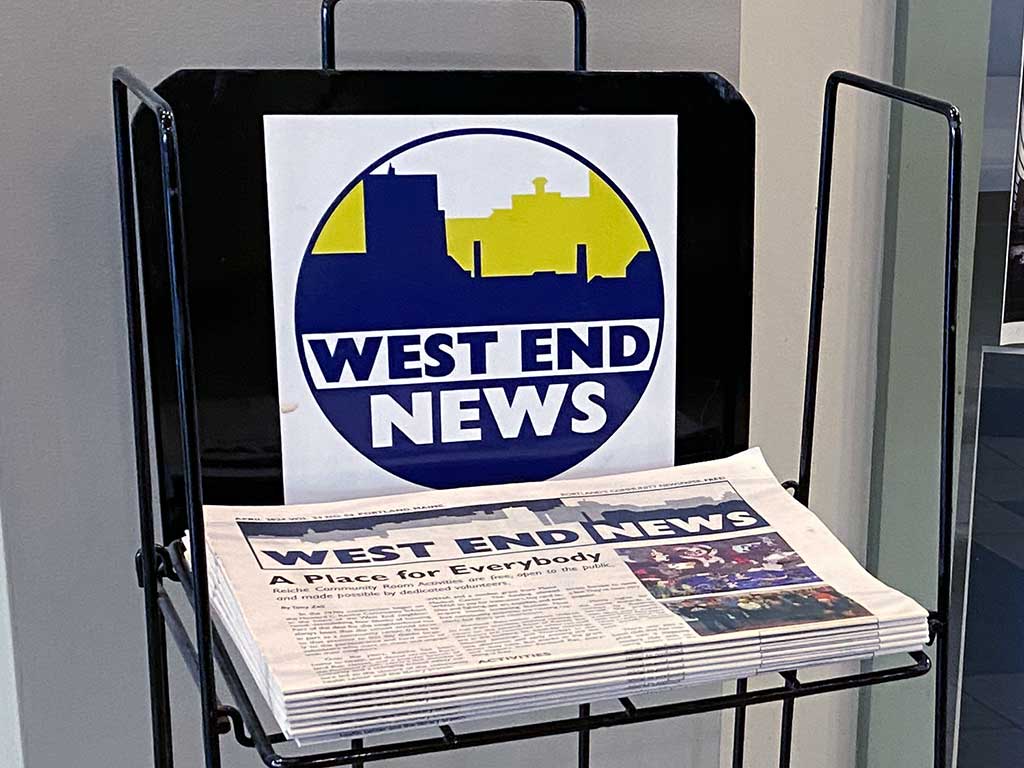
By Colin Monahan
Portlanders have every reason to be proud of their Forest City (and Bostonians have every right to be jealous): a postcard-perfect New England vacationland with a working waterfront steeped in a rich maritime heritage, world-class seafood, thriving craft beer scene, a flourishing culinary and arts community, the list goes on. Yet, despite all of Portland’s accolades, the city is rarely recognized as a hub for alternative and independent media.
Media scholars agree that journalism is in the midst of a crisis. According to a study by Northwestern University, one-third of all American newspapers have ceased operations since 2005, nearly 3,300 publications, leaving close to 55 million Americans with limited to no access to local news in 2024 alone. To make matters worse for the industry, Americans simply don’t trust the media as an institution. A recent Gallup poll found that only 31% of Americans trust the media, a new historic low. These alarming statistics can be attributed in part to the increasing radical commercialization and polarization of the industry. Consider tech billionaires like Jeff Bezos purchasing The Washington Post in 2013 and Elon Musk acquiring Twitter in 2022.
Portland: A Cradle For Independent Media
Meanwhile, Portland has been quietly nurturing impactful independent media outlets, some with national, even international, readership. Independent journalism, as defined by the Civil Liberties Union for Europe, refers to any news media that is free from influence by the government or external sources, such as corporations or powerful individuals. Common Dreams, headquartered on York Street, is a great example of homegrown independent journalism. Founded in 1997 by Maine Public Interest Research Group Director, Craig Brown, Common Dreams prides itself in its editorial independence, completely reader supported with no government or corporate funding, nor advertisers.
The progressive outlet has been a central voice in the anti-war movement. They captured early internet readership with alternative coverage of the 1999 Kosovo and 2001 Iraq wars and by featuring notable intellectual contributors such as Howard Zinn, Robert Reich, and Noam Chomsky. Today, Portland’s Common Dreams steadily grows with millions of readers worldwide. Amongst them is Graham Nash, guitarist of the supergroup Crosby, Stills & Nash:
“I read and support Common Dreams because it brings me the news that I care about and can’t find anywhere else. We need Common Dreams to continue as an independent voice in the media.”
Means TV – The World’s First Worker-Owned Streaming Service
“We don’t put journalism on some pedestal, people are capable of journalism,” wrote Nick Hayes, founder of Means TV, in a correspondence with WEN. Headquartered on Congress Street, Means TV is a newer addition to Portland’s media landscape.
Founded in Detroit in 2019 by filmmakers Nick Hayes and Naomi Burton, the platform bills itself as “the world’s first worker-owned, anti-capitalist streaming service.” Means TV hosts an online streaming library of films, series, and a daily news program aimed at “reflecting and empowering the 99%.” The duo relocated to Portland after their home and office was targeted in a drive-by shooting.
Before launching Means TV, Hayes and Burton founded the ad production company Means of Production, which gained national attention for producing Courage to Change, the campaign ad for Bronx Congresswoman Alexandria Ocasio-Cortez during her first bid in the 2018 midterm primaries.
“We have found [Portland] to be an incredibly dynamic place to live in politically,” said Hayes, citing rising housing costs, a tourism-dependent economy, and its status as a sanctuary city with a growing homeless population. Issues that Means TV seeks to bring to light. He added that the city is also home to a growing movement of young people organizing for a more equitable and livable future.
Start-up Success
Means TV has been hailed as a media start-up success. All the more impresive, they’ve accomplished this success in an era of financial uncertainty within the journalism industry. Uscreen, Means’ media hosting platform, features the worker cooperative as a case study on its website, highlighting its revenue of over $40,000 per month. As a member of the U.S. Federation of Worker Cooperatives, Means is owned and run by its members, employees, and contractors. Each individual has the opportunity to buy into ownership at various levels, with profits shared throughout the cooperative.
With just three full-time employees, Means remains competitive by being too small to fail, said Hayes. However, Means real success is their commitment to principled authenticity. “In a time when it’s increasingly difficult to tell what a given media platform’s editorial voice is, we’re transparent and open about our communist values and people seem to find that refreshing.”

Steady As She Goes – The Bollard Celebrates 20 Years
While outlets like Common Dreams and Means TV may have a national reach, Portland’s local publications that readers find in coffee shops, record stores, and bakeries offer a more intimate window into the world of independent media. Chris Busby, a longtime figure in alternative news, is celebrating The Bollard’s 20th anniversary this year. Before he founded the paper in 2005, Busby cut his teeth as a listings editor at the Boston Phoenix, Casco Bay Weekly, and City Newspaper in Rochester, New York.
“We want to give people who have been marginalized by society a voice and a forum to get their writing and art out there,” said Busby. “We work with folks like Kenny Wayne Beek, a recently housed writer; we published his memoir called ‘Transience’ over the course of several years.” “Transience” is an extensive memoir chronicling Beek’s experience with homelessness, incarceration and addiction across Maine.
Busby sees Portland as a supportive environment for independent media, noting its manageable size. “There’s more of a sense of Portland being a community. You can wrap your head around what’s going on in the entire city. We can present all of the art things that are happening every day.” However, the support goes both ways. The Bollard was a founding member of the Portland Buy Local Campaign, a nonprofit coalition established in 2006 to push back against the growing presence of national chains. “The alternative press in Portland offers an honest perspective of the reality from our day to day lives. It’s something to be trusted,” said Busby.
Independent Tradition
Michael Socolow is a media historian at the University of Maine. He suggests that while Maine may be more skeptical of the media than other parts of the country, this skepticism generally fosters a healthier relationship with the news. He points to Ross Perot’s 1992 third-party victory over George H.W. Bush in Maine, the most significant since Theodore Roosevelt’s 1912 Progressive Party, as well as Independent Senator Angus King’s success, to highlight Maine’s strong independent tradition.
According to Socolow, this tradition fosters a more discerning yet healthy approach to trust in the news. “Portland is a young, vibrant, growing, city with a dynamic culture,” he added. “It should be able to produce successful and sustainable media, even at the low levels. Hopefully, we are at the start of seeing that occur.”
Support Independent, Local Journalism

Local journalism may offer a path to restoring trust in the media. “The Bollard is trusted in large part because I’m the face of it,” said Busby. “My cell phone number is in every issue. I’m accountable for everything that we publish. Having that accountability goes a long way towards building trust.” Independent journalism remains a crucial watchdog, holding people in power to account.
“The media, like every other institution that wields power over Americans, is owned by billionaires and private equity groups beholden to the preservation of the status quo and the maintenance of capitalism,” said Hayes. “Independent journalism should always be an analysis of power.”
Independent journalism plays a vital role in local democracy and community engagement. “The support of The West End News has been critical to WENA’s success,” said Rosanne Graef, vice president of the West End Neighborhood Association and former contributor. The West End News uses its platform to publicize neighborhood meetings, highlight local issues, and keep residents informed about the decisions shaping their lives.
To learn more and support Portland’s independent media, explore the following outlets:
WEN: https://thewestendnews.com/community-news-champion
The Bollard: https://bollardhead.substack.com/
Means TV: https://means.tv
Common Dreams: https://www.commondreams.org/
About the Author
Colin Monahan is a freelance journalist and a graduate student of Media Studies at Ludwig-Maximilians-Universität Munich. His work has focused on social movements, labor, conflict, and adventure. He has reported from Mexico, Chile, Cuba, Denmark, and across the United States. Colin believes in accessible, independent, grassroots journalism. You can reach Colin at Monahancolin@gmail.com.
About WEN
The West End News (WEN) is a mission-driven publication, and supporting us is simple. Become a Community News Champion by contributing today. Your support directly funds our reporting, as well as the printing and distribution of our free newspaper. Visit https://thewestendnews.com/community-news-champion to make a non-tax-deductible contribution to our community newspaper today.





